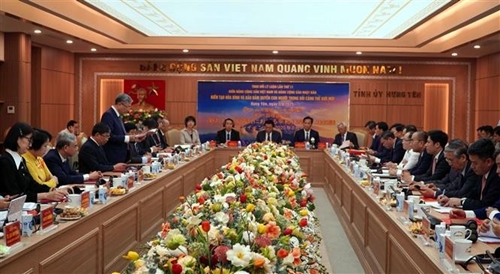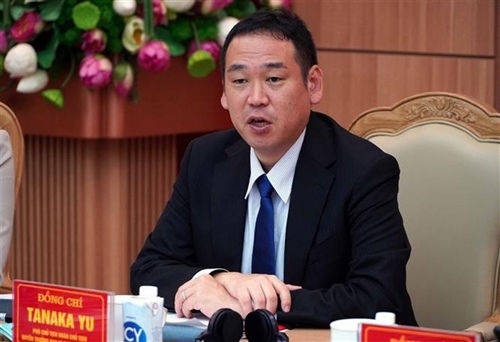The Vietnamese delegation was led by Politburo member, Chairman of the Central Theoretical Council, and President of the Ho Chi Minh National Academy of Politics Nguyen Xuan Thang, while the Japanese delegation was headed by Vice Chairman of the JCP Presidium Tanaka Yu.
    |
 |
|
At the theoretical exchange between the CPV and JCP on August 2 |
In his opening remarks, Thang described the exchange as a platform to share ideological and theoretical perspectives, and a clear testament to the strong friendship and comprehensive cooperation between Vietnam and Japan, contributing to reinforcing the role and position of the communist parties in each country’s socio-political and security life, with ripple effects across East Asia and globally.
Amid growing global challenges, including regional conflicts, climate change, social inequality, and human rights concerns, the two parties share a strong commitment to building and sustaining global peace based on mutual respect and the protection of human rights, he said, calling peace building and human rights protection core missions and universal norms of the international community and global governance institutions.
The CPV attaches importance to peace building by continuously strengthening national capacity and improving living standards, actively and proactively expanding global integration for the sake of peace, stability, and development in the region and the world, Thang added.
The Vietnamese official further stressed that the CPV has been renewing and refining its understanding, stance, and policies on human rights in recent years.
Tanaka, for his part, praised the resumption of the exchange after a three-year hiatus. He conveyed a message from Chairman of the JCP Central Committee Shii Kazuo expressing his appreciation for cooperation in strengthening party-to-party relations and acknowledging the relevance of this year’s theme amid global and regional shifts.
Congratulating Vietnam on major national milestones in 2025, including the 50th anniversary of the Liberation of the South and National Reunification, and the 80th anniversary of the August Revolution (August 19) and National Day (September 2), he described these as monumental and historically significant victories, saying that Vietnam’s Declaration of Independence in 1945 was a "prelude" to a new era of national liberation that expanded across Asia and Africa, ultimately contributing to the global collapse of colonialism.
    |
 |
|
Vice Chairman of the JCP Presidium Tanaka Yu speaks at the event. |
Tanaka said despite unpredictable global developments, the tendency toward peace and progress remains dominant. He praised ASEAN’s “Outlook on the Indo-Pacific” (AOIP), adopted in 2019, and the key principles reaffirmed at the ASEAN Future Forum held in Hanoi in February 2025. These include upholding ASEAN’s centrality, promoting a rules-based international order, and advancing cooperation in regional peace building.
ASEAN cooperation stands out as a bright spot, making a meaningful contribution to global and regional peace, the official said.
He stressed the urgency and significance of the exchange of views between the two parties on peace-building and the protection of human rights, issues that hold profound significance to not only the people of Vietnam and Japan, but also across East Asia and beyond.
Commending Vietnam’s foreign policy approach built on the pillars of Party, State, and people-to-people diplomacy, he affirmed that the JCP’s commitment to deepening solidarity and cooperation with the CPV for global peace and progress.
Both sides agreed to step up their theoretical exchange mechanism with practical, tailored formats and hold the next meeting in Japan in 2026.
Source: VNA